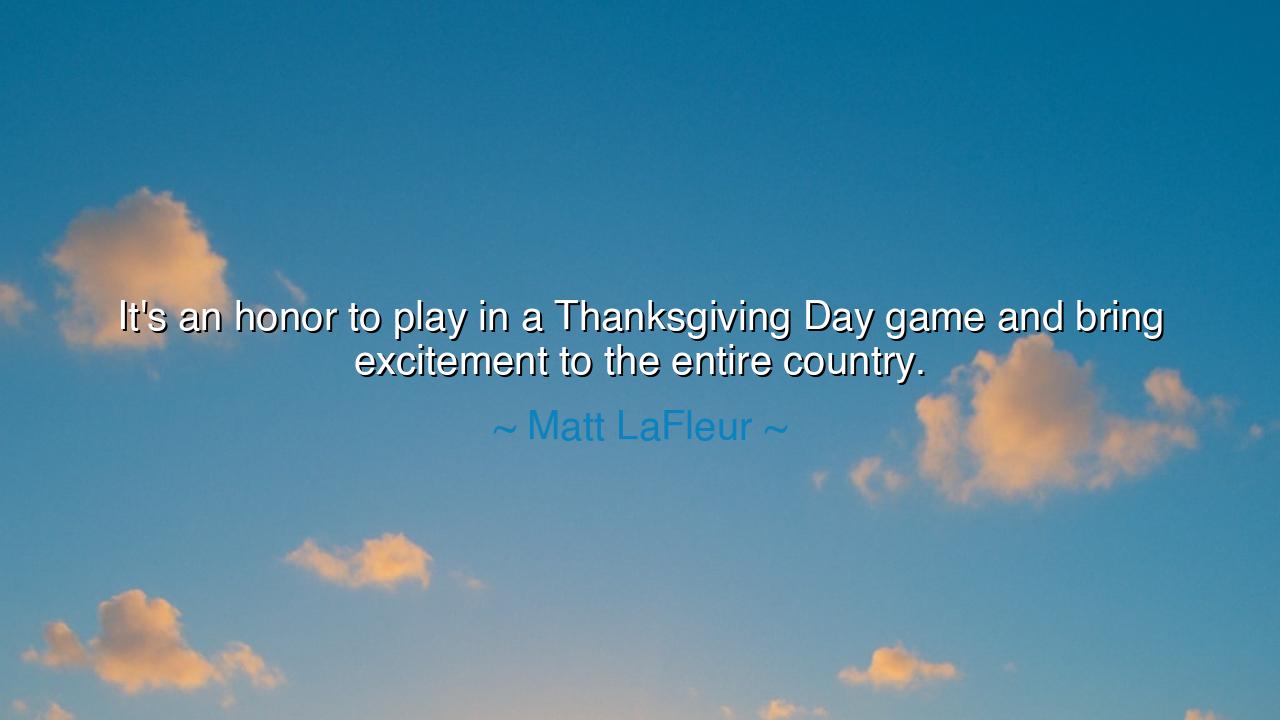
It's an honor to play in a Thanksgiving Day game and bring
It's an honor to play in a Thanksgiving Day game and bring excitement to the entire country.






The words of Matt LaFleur—“It's an honor to play in a Thanksgiving Day game and bring excitement to the entire country.”—speak to more than a contest upon the field; they touch the soul of tradition, of community, and of the shared joy that binds a nation. For on this day of gratitude, when families gather around tables heavy with food and hearts full of memory, there is also the rhythm of another feast: the game. And in this game, played beneath the eyes of millions, men labor not only for victory but for the gift of excitement—the spark that unites households from coast to coast in common celebration.
The ancients knew well the power of sport to bind people together. In Greece, the Olympic Games were not mere contests of strength; they were sacred gatherings, where wars ceased, and city-states set aside conflict to honor both gods and humanity’s striving spirit. Victors were crowned not only with olive wreaths but with glory that resonated across generations. LaFleur’s words echo this same truth: that to step upon the field on a day so deeply woven into a people’s fabric is not merely a game, but an honor, a participation in something larger than oneself.
History shows us how rituals of sport can become part of national identity. During World War II, American soldiers overseas tuned into radio broadcasts of baseball and football, clinging to them as lifelines to home. The games became more than entertainment; they were symbols of endurance, of continuity, of the culture they fought to defend. So too does the Thanksgiving Day game carry this meaning: it is no longer just sport, but a tradition that reflects unity, resilience, and joy shared across a vast and diverse land.
LaFleur’s words also remind us that the role of the athlete is not merely to compete, but to inspire. When he speaks of bringing excitement to the entire country, he acknowledges the sacred trust placed upon those who play. Their sweat and effort ripple outward, filling homes with cheer, giving families another story to share, another memory to weave into the fabric of the holiday. This is why the game matters—not only for touchdowns or victories, but for its power to remind a people of their togetherness, even in times of division or hardship.
The meaning here runs deep: to play on Thanksgiving is to serve. It is to give one’s strength and skill as an offering to the community. Just as the cook labors in the kitchen, just as parents labor in love, so too does the athlete labor for the joy of the people. In this way, the game becomes another form of gratitude—a celebration not just of sport, but of belonging, of continuity, of the life of a nation carried forward through ritual and tradition.
The lesson for us is this: honor is found not only in achievement, but in service. Whatever stage you stand upon—whether it be the field, the workplace, or the family table—your task is to bring joy, to bring light, to bring connection to others. The Thanksgiving Day game is but one example of how ordinary acts of work, when tied to tradition and community, become extraordinary gifts.
Therefore, let your actions be these: seek to serve others with your talents. Remember that joy multiplies when shared, and that traditions are sanctified by the contributions of all who partake in them. Treat your responsibilities as an honor, not a burden, for through them you may kindle excitement, hope, and unity in the lives of many.
Thus, Matt LaFleur’s words stand as a reminder: to play, to serve, to inspire on a day of gratitude is no small duty, but a sacred honor. Let future generations remember this truth: that greatness lies not only in victory, but in the joy we bring to others, and in the traditions we uphold together.






AAdministratorAdministrator
Welcome, honored guests. Please leave a comment, we will respond soon